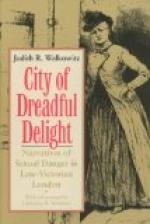“What is this?” he asked.
The publican raised his brows.
“Hast never heard of the Passover?” he asked.
The Maccabee started. How far he had drifted from the customs of his people, to fail to remember its vital feast—he who meant to be king over the Jews!
He turned away a little abashed. The train of thought awakened by the khan-keeper’s answer led him back to the hieratic customs of his race. What was his status as a Jew after all these years of delinquency? What atonement did he owe, what offering should he make?
He went out over the cobbled pavement of the lewen to the gate. Here he should see part of his people and learn from simple observation what material he would have in his work for Israel.
From his memories of the old Passovers of his boyhood, he saw instantly that there had come a change over Judea and the worshiping sons of Abraham.
They went in bodies, in numbers from a handful from some remote but pious hamlet to great armies from the leveled cities of Joppa, Ptolemais and Anthedon, from Caesarea and Tyre and Sidon, from the enthusiastic towns in Galilee, and even from far-off Antioch and Ephesus. They were not fewer in number, because of a year of warfare and the menace of an approaching army upon the city in which they were to take refuge. But there were more—double, even triple the number that usually went up to Jerusalem at this time. For of the millions of inhabitants in Judea in the unhappy year of 70 A.D., a third of them were plundered and homeless refugees from ruined cities. Therefore, instead of the armies of men, happy, hopeful and enthusiastic, who had journeyed in former years to Jerusalem, there passed before the Maccabee a mixed multitude of men and women and children. Thousands carried with them all that warfare had left to them—pitiful parcels of treasure or household goods, or extra clothing; other thousands bore nothing in their hands, and by the wear in their garments and the hunger in their faces, it seemed that they owned nothing to carry.
The Maccabee noted finally the entire absence of the travelers who fared in state. Not in all that long procession that wound up the stony passage from the west, did he see a single Sadducee. There went mobs of laborers and farmers, tradesmen, servants and small merchants, but the Jewish friends of Rome that had once made part of the Passover pilgrimage a royal progress were nowhere to be seen. Under the vast, vivid blue of the mountain skies they moved, indifferent to the splendid benevolence of the untroubled day. The pure wind swept in from the radiance in the east, flinging out multi-colored garments and scarves, rushing with its bracing chill without obstruction through even the compactest mass of wayfarers. The cedars on the hills about the little town whistled continuously and at times some extremely narrow defile with an uninterrupted draft would take voice and cry humanly. But there was no responsive exhilaration to the vigor of morning on a mountain-top. The great ever-growing migration was dark, dangerous and moody.




